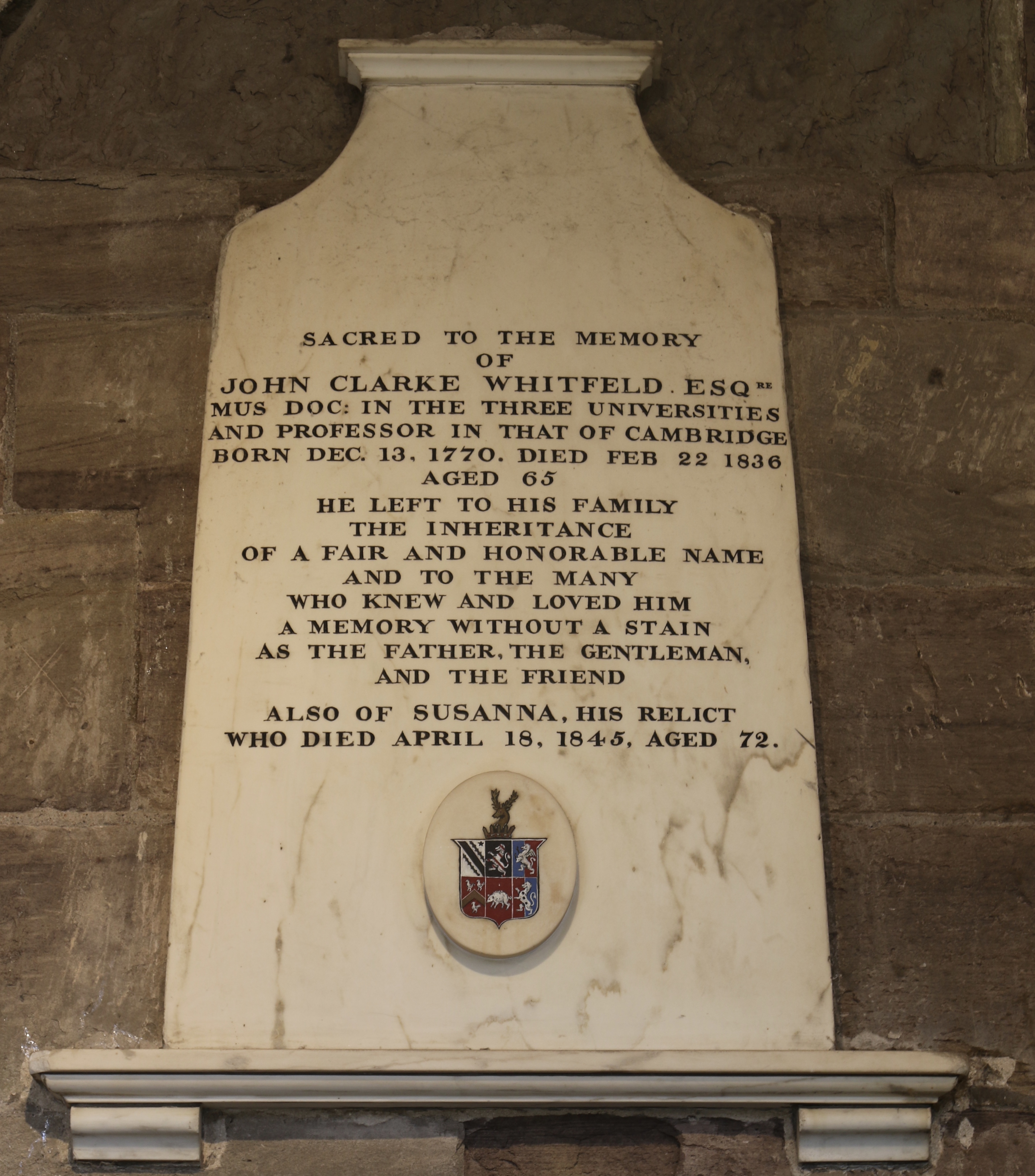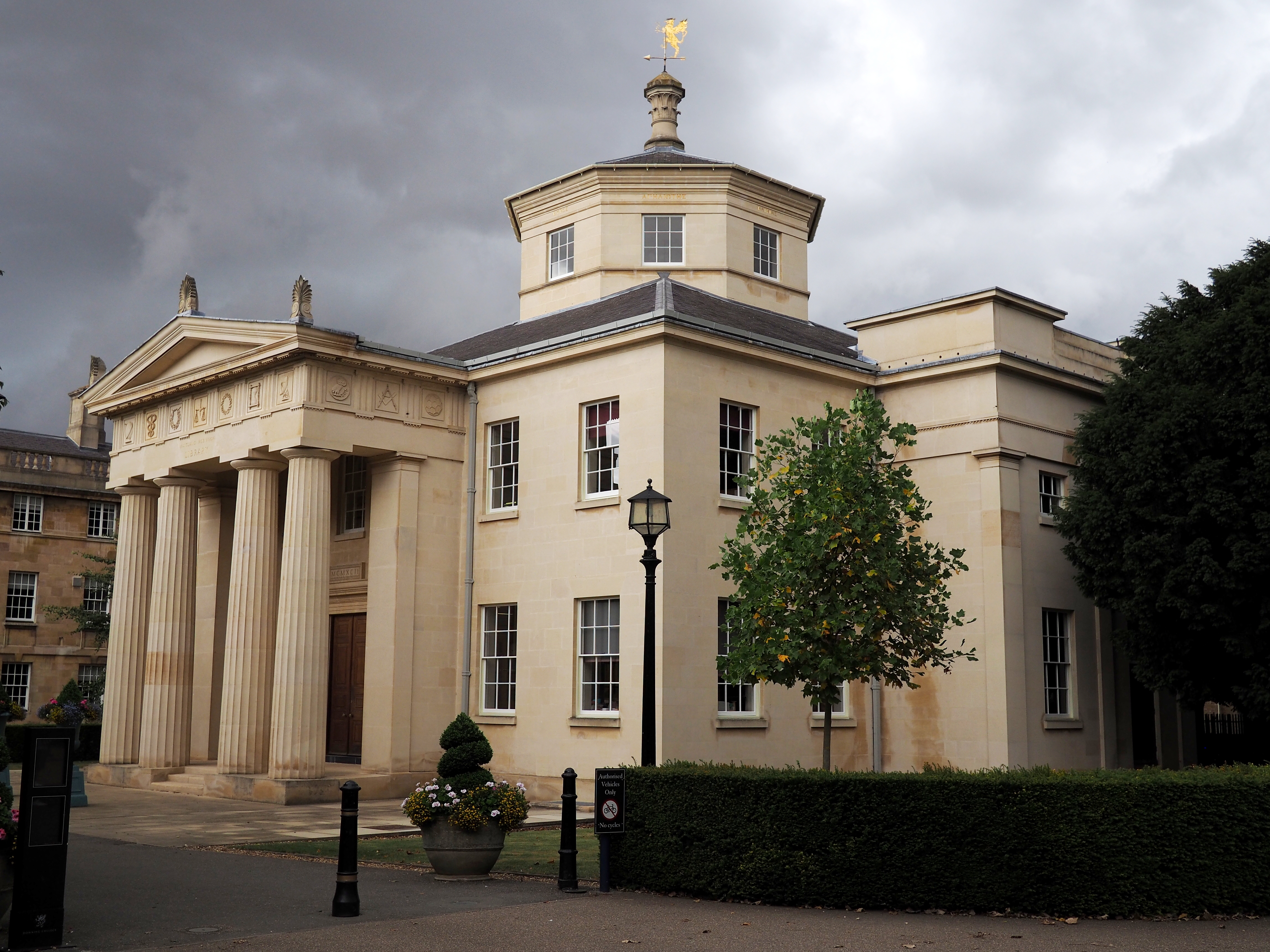|
John Clarke Whitfield
John Clarke-Whitfeld (13 December 1770 – 22 February 1836) was an English organist and composer. Life He was born John Clarke at Gloucester, and educated at Oxford under Dr Philip Hayes. In 1789 he was appointed organist of the parish church at Ludlow. Four years later he took the degree of Mus. Bac. at Cambridge, and in 1795 he was chosen as organist of Armagh cathedral, whence he removed in the same year to Dublin, with the appointments of organist and master of the children at St Patrick's Cathedral and Christchurch. Driven from Ireland by the rebellion of 1798, he accepted the post of organist at Trinity and St John's Colleges, Cambridge,. He took the degree of Mus. Doc. at Cambridge in 1799, and in 1810 proceeded to the same grade at Oxford. In 1814 he assumed the surname of Whitfeld, in addition to that of Clarke, in anticipation of an inheritance which failed to materialise. Press cutting - ''Bury & Norwich Post'' 1 June 1814 - ''Tuesdays Gazette: John Cla ... [...More Info...] [...Related Items...] OR: [Wikipedia] [Google] [Baidu] |
John Clarke Whitfeld
John Clarke-Whitfeld (13 December 1770 – 22 February 1836) was an English organist and composer. Life He was born John Clarke at Gloucester, and educated at Oxford under Dr Philip Hayes. In 1789 he was appointed organist of the parish church at Ludlow. Four years later he took the degree of Mus. Bac. at Cambridge, and in 1795 he was chosen as organist of Armagh cathedral, whence he removed in the same year to Dublin, with the appointments of organist and master of the children at St Patrick's Cathedral and Christchurch. Driven from Ireland by the rebellion of 1798, he accepted the post of organist at Trinity and St John's Colleges, Cambridge,. He took the degree of Mus. Doc. at Cambridge in 1799, and in 1810 proceeded to the same grade at Oxford. In 1814 he assumed the surname of Whitfeld, in addition to that of Clarke, in anticipation of an inheritance which failed to materialise. Press cutting - ''Bury & Norwich Post'' 1 June 1814 - ''Tuesdays Gazette: John Clar ... [...More Info...] [...Related Items...] OR: [Wikipedia] [Google] [Baidu] |
Oratorio
An oratorio () is a musical composition with dramatic or narrative text for choir, soloists and orchestra or other ensemble. Similar to opera, an oratorio includes the use of a choir, soloists, an instrumental ensemble, various distinguishable characters (e.g. soloists), and arias. However, opera is musical theatre, and typically involves significant theatrical spectacle, including sets, props, and costuming, as well as staged interactions between characters. In oratorio, there is generally minimal staging, with the chorus often assuming a more central dramatic role, and the work is typically presented as a concert piece – though oratorios are sometimes staged as operas, and operas are not infrequently presented in concert form. A particularly important difference between opera and oratorio is in the typical subject matter of the text. An opera libretto may deal with any conceivable dramatic subject (e.g. history, mythology, Richard Nixon, Anna Nicole Smith an ... [...More Info...] [...Related Items...] OR: [Wikipedia] [Google] [Baidu] |
English Classical Composers
English usually refers to: * English language * English people English may also refer to: Culture, language and peoples * ''English'', an adjective for something of, from, or related to England * ''English'', an Amish term for non-Amish, regardless of ethnicity * English studies, the study of English language and literature Media * English (2013 film), ''English'' (2013 film), a Malayalam-language film * English (novel), ''English'' (novel), a Chinese book by Wang Gang ** English (2018 film), ''English'' (2018 film), a Chinese adaptation * The English (TV series), ''The English'' (TV series), a 2022 Western-genre miniseries * English (play), ''English'' (play), a 2022 play by Sanaz Toossi People and fictional characters * English (surname), a list of people and fictional characters * English Fisher (1928–2011), American boxing coach * English Gardner (born 1992), American track and field sprinter * English McConnell (1882–1928), Irish footballer * Aid ... [...More Info...] [...Related Items...] OR: [Wikipedia] [Google] [Baidu] |
1836 Deaths
Events January–March * January 1 — Hill Street Academy is named Colombo Academy and acquired by the Government, establishing the first public school in Sri Lanka. * January 1 – Queen Maria II of Portugal marries Prince Ferdinand Augustus Francis Anthony of Saxe-Coburg-Gotha. * January 5 – Former U.S. Representative Davy Crockett of Tennessee arrives in Texas to join the Texan fight for independence from Mexico. * January 12 ** , with Charles Darwin on board, reaches Sydney. ** Will County, Illinois, is formed. * February 8 – London and Greenwich Railway opens its first section, the first railway in London, England. * February 23 – Texas Revolution: The Battle of the Alamo begins, with an American settler army surrounded by the Mexican Army, under Santa Anna. * February 25 – Samuel Colt receives a United States patent for the Colt revolver, the first revolving barrel multishot firearm. * March 1 – Texas Revolution – Convention of 1836: Delegates from m ... [...More Info...] [...Related Items...] OR: [Wikipedia] [Google] [Baidu] |
1770 Births
Events January– March * January 1 – The foundation of Fort George, Bombay is laid by Colonel Keating, principal engineer, on the site of the former Dongri Fort. * February 1 – Thomas Jefferson's home at Shadwell, Virginia is destroyed by fire, along with most of his books. * February 14 – Scottish explorer James Bruce arrives at Gondar, capital of Abyssinia (modern-day Ethiopia) and is received by the Emperor Tekle Haymanot II and Ras Mikael Sehul. * February 22 – Christopher Seider, an 11-year-old boy in Boston in the British Province of Massachusetts Bay, is shot and killed by a colonial official, Ebenezer Richardson. The funeral sets off anti-British protests that lead to the massacre days later. * March 5 – Boston Massacre: Eleven American men are shot (five fatally) by British troops, in an event that helps start the American Revolutionary War five years later. * March 21 – King Prithvi Narayan Shah shifts ... [...More Info...] [...Related Items...] OR: [Wikipedia] [Google] [Baidu] |
Samuel Sebastian Wesley
Samuel Sebastian Wesley (14 August 1810 – 19 April 1876) was an English organ (music), organist and composer. Wesley married Mary Anne Merewether and had 6 children. He is often referred to as S.S. Wesley to avoid confusion with his father Samuel Wesley. Biography Born in London, he was the eldest child in the composer Samuel Wesley (composer, born 1766), Samuel Wesley's second family, which he formed with Sarah Suter having separated from his wife Charlotte. Samuel Sebastian was the grandson of Charles Wesley. His middle name derived from his father's lifelong admiration for the music of Bach. After singing in the choir of the Chapel Royal as a boy, Samuel Sebastian embarked on a career as a musician, and was appointed organist at Hereford Cathedral in 1832. While there he married the sister of the Dean, John Merewether. S.S. Wesley was, like his father Samuel Wesley, a Freemason. He was initiated in Palladian Lodge No.120 in Hereford on 17 September 1833. He moved to E ... [...More Info...] [...Related Items...] OR: [Wikipedia] [Google] [Baidu] |
Director Of Music
A music director, musical director or director of music is a person responsible for the musical aspects of a performance, production, or organization. This would include the artistic director and usually chief conductor of an orchestra or concert band, the director of music of a film, the director of music at a radio station, the person in charge of musical activities or the head of the music department in a school, the coordinator of the musical ensembles in a university, college, or institution (but not usually the head of the academic music department), the head bandmaster of a military band, the head organist and choirmaster of a church, or an organist and master of the choristers (the title given to a director of music at a cathedral, particularly in England). Orchestra The title of "music director" or "musical director" is used by many symphony orchestras to designate the primary conductor and artistic leader of the orchestra. The term "music director" is most common for ... [...More Info...] [...Related Items...] OR: [Wikipedia] [Google] [Baidu] |
Buckinghamshire
Buckinghamshire (, abbreviated ''Bucks'') is a Ceremonial counties of England, ceremonial county in South East England and one of the home counties. It is bordered by Northamptonshire to the north, Bedfordshire to the north-east, Hertfordshire to the east, Greater London to the south-east, Berkshire to the south, and Oxfordshire to the west. The largest settlement is the city of Milton Keynes, and the county town is Aylesbury. The county has an area of and had a population of 840,138 at the 2021 census. ''plus'' Besides Milton Keynes, which is in the north-east, the largest settlements are in the southern half of the county and include Aylesbury, High Wycombe, and Chesham. For Local government in England, local government purposes Buckinghamshire comprises two Unitary authorities of England, unitary authorities, Buckinghamshire Council and Milton Keynes City Council. The Historic counties of England, historic county had slightly different borders, and included the towns of S ... [...More Info...] [...Related Items...] OR: [Wikipedia] [Google] [Baidu] |
Granborough
Granborough (previously Grandborough) is a village and civil parish in Buckinghamshire, England. It is around north of Waddesdon and south-east of Buckingham. The nearest town is Winslow. The village name is Anglo-Saxon in origin, and means 'green hill'. In the Domesday Book of 1086 the village was recorded as ''Grenesberga''. Anciently the manor of Granborough was owned by the abbey at St Albans, though in the Dissolution of the Monasteries in 1547 ownership passed automatically to the Crown. The ancient parish church, dedicated to St John the Baptist, was demolished during the English Civil War, though was rebuilt shortly after the Restoration of the Monarchy in 1685. The village is still one of the possessions of the Crown. There is a public house, logically called the Crown. After the parish church the most interesting building is the neat half-timbered Arts and Crafts village hall. Granborough still has very many thatched Thatching is the craft of building a roo ... [...More Info...] [...Related Items...] OR: [Wikipedia] [Google] [Baidu] |
Downing College, Cambridge
Downing College is a constituent college of the University of Cambridge and currently has around 950 students. Founded in 1800, it was the only college to be added to the university between 1596 and 1869, and is often described as the oldest of the new colleges and the newest of the old. Downing College was formed "for the encouragement of the study of Law and Medicine and of the cognate subjects of Moral and Natural Science", and has developed a reputation amongst Cambridge colleges for Law and Medicine. In 2012, Downing was named one of the two most eco-friendly Cambridge colleges. History Upon the death of Sir George Downing, 3rd Baronet in 1749, the wealth left by his grandfather, Sir George Downing, 1st Baronet, who served both Cromwell and Charles II and built 10 Downing Street (a door formerly from Number 10 is in use in the college), was applied by his will. Under this will, as he had no direct issue (he was legally separated from his wife), the family fortune was ... [...More Info...] [...Related Items...] OR: [Wikipedia] [Google] [Baidu] |




